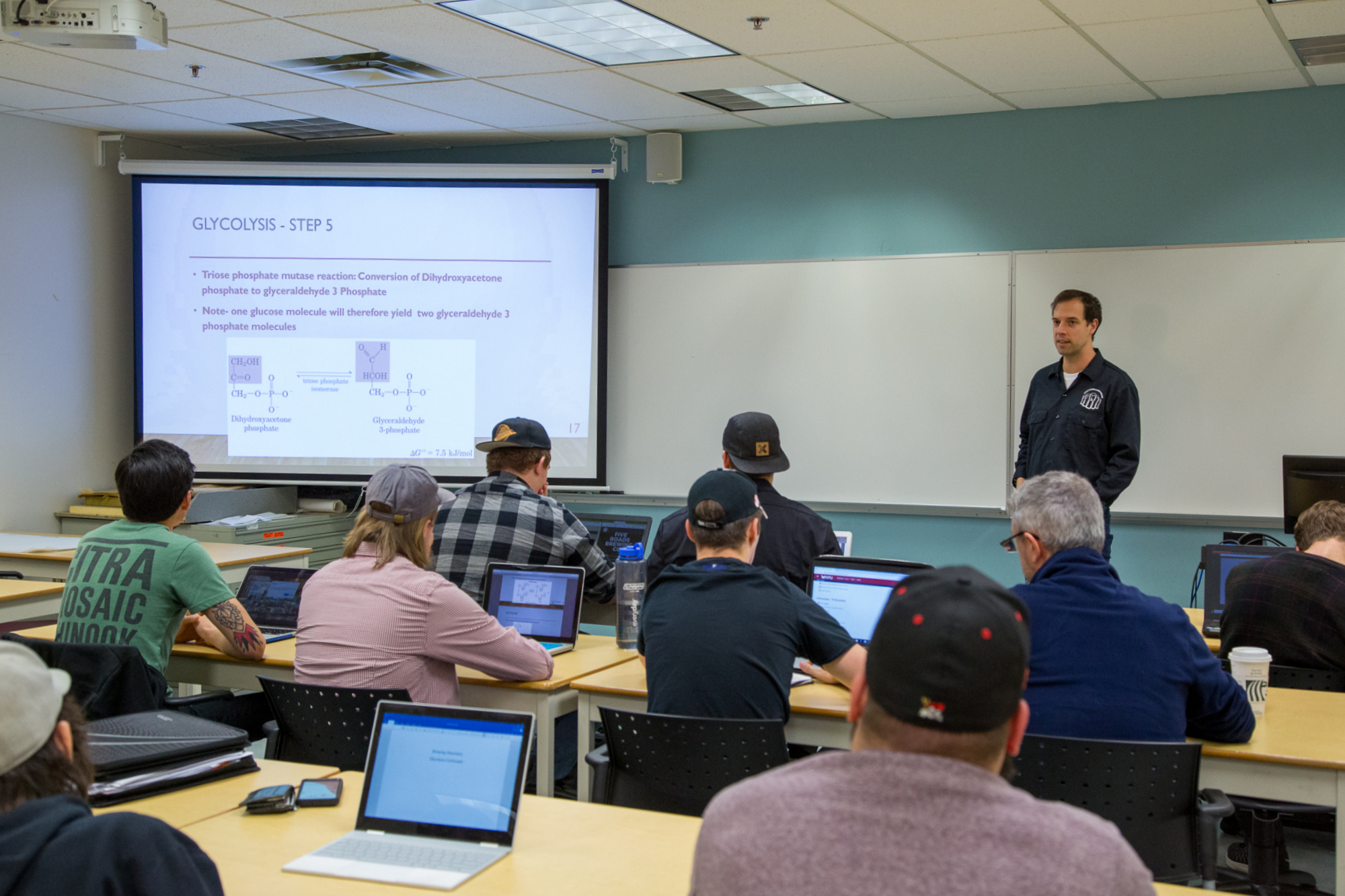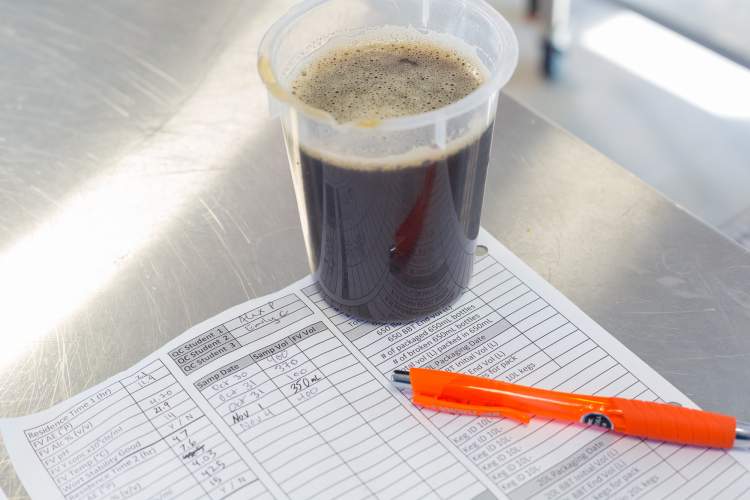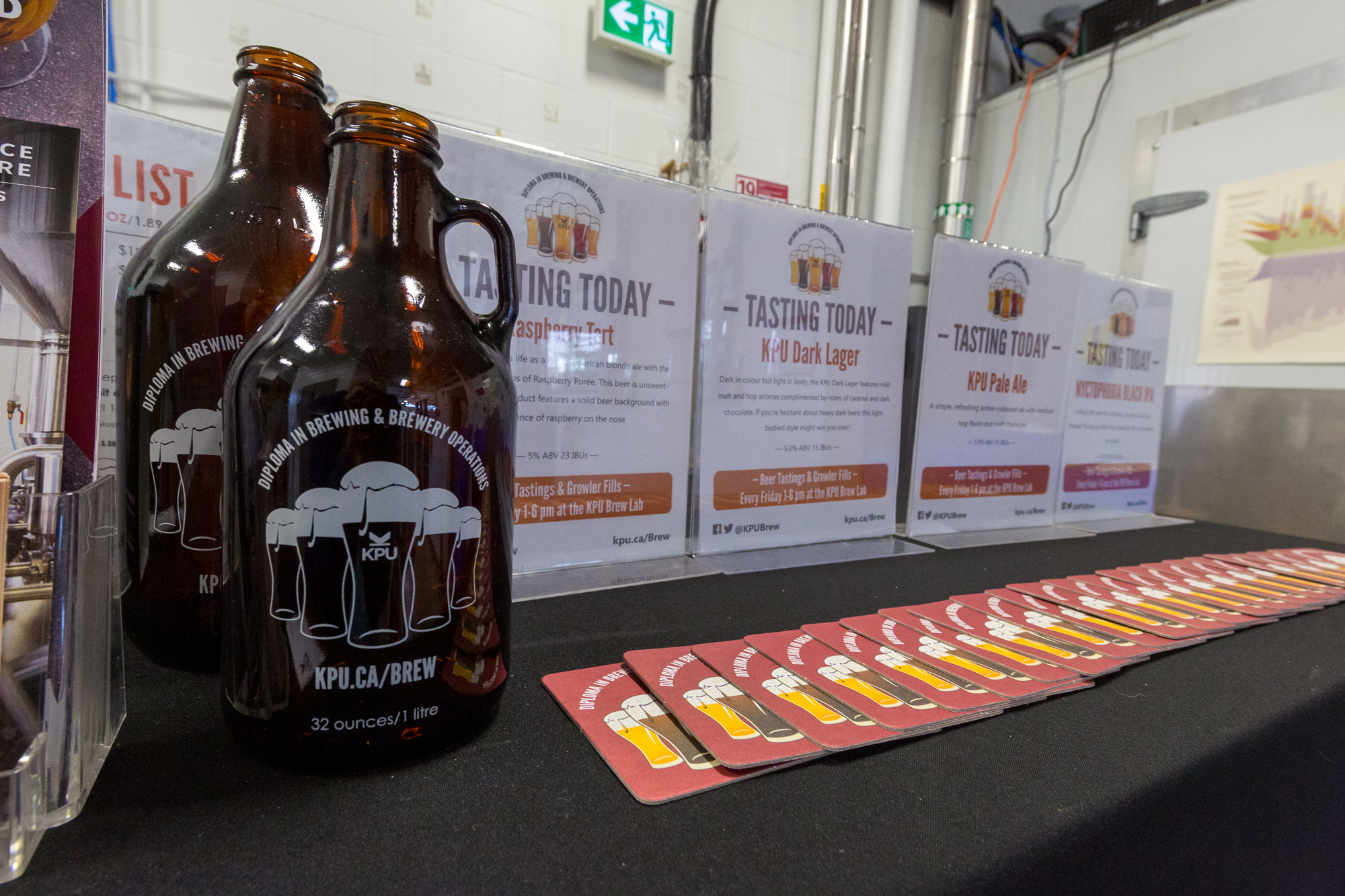
KPU Brewing: BC’S Class Of Beer, Part 2
In the classroom at the KPU Brewing program. Photo: Brian K. Smith
Is The KPU Brew Lab a Real Brewery?
Every Friday from 1:00-6:00 PM during the school term, you can visit the KPU Brew Lab at Kwantlen Polytechnic University’s Langley campus and buy yourself a growler fill. It’s a bit odd to drive up to a university for that weekend beer run, but it’s a great way to support the students and find out if their beer is really good enough to win all those trophies.
To get to the pouring station, you’ll walk by the brewhouse. With its columns of tiny fermenters that accommodate multiple brew teams, it resembles an alien laundromat. Given its modest capacity (2 hl NSI system), some might question whether this lab could properly be called a brewery. The answer: go look at the awards shelf.

Building a teaching brewhouse isn’t the same as establishing your typical science course. As Dean Betty Worobec recalls, “Our first class began September 2014. I really thought the brewery would be ready by then. But we had to do a lot of adjustments because we couldn’t get into the brewery until February. So that first class was different than the ones that came after.”
Delays in construction and launch. If nothing else, that should convince anyone familiar with craft industry start-ups that KPU Brew Lab is a real brewery.
During that building phase, the team continued community outreach, meeting many of the brewers that instructor Dominic Bernard knew at places like Parallel 49, Coal Harbour, Main Street and Strange Fellows. He and Nancy More also toured Delta’s Turning Point Brewery (aka the Stanley Park label, now owned by Labatt) as well. After the program was underway, there were student field trips to places like the Molson brewery on Burrard, when it was operational.

That highlights something in KPU’s approach that differs from the other BC institutions that have explored the beer education space. For instance, the Pacific Institute of Culinary Arts (PICA) offers a craft beer appreciation course, and in 2020 Okanagan College will do the same.
Then there’s Simon Fraser University, who actually beat KPU to the punch when a Science of Brewing course kicked off at its Surrey campus in January 2014. That effort was followed by a wider Craft Beer and Brewing Essentials program targeted at homebrew hobbyists and working industry personnel looking to brush up on their knowledge. The name of the program reflects the obvious current appeal of learning “craft” brewing, so the program wasn’t conceived to train people who might want to work in a large-scale commercial operation.
KPU wants no such limitation. Instructor Martina Solano Bielen says, “Within the first month, some students might decide, ‘I would like to work at Molson. What can I do to get there?’ Then there will be students who would never want to work at Molson.” Nevertheless, the goal of KPU’s two-year program is to educate people—with hands-on training—to the level that they would be seriously considered for work anywhere from an esoteric craft outlet to a giant international brewery. For instance, one KPU grad was hired as production manager at Granville Island Brewing, which is a subsidiary of Molson Coors. That’s a respectable job.

The understanding that brewing jobs aren’t only out there in fashionable micros probably stems from the experience of the faculty, with instructor and BC Craft Brewers Guild leader Ken Beattie originally coming from Molson and Sleeman, business instructor Nancy More from Labatt and Guinness, and marketing instructor Stan Wong previously at Labatt. They are all invested in the BC craft scene, but they also recognize the technical excellence of many brewers at the Big Beer level…and they’ve helped shape a program with the chops to vie with the ones that inspired it in a relatively short time.
In fact, there is one category in which KPU has indisputably outdone the national competition, thanks to their 2017 designation as a Recognized Program by the Master Brewers Association of the Americas (MBAA), for meeting its “approved guidelines and learning outcomes.” As of this writing, only a dozen other US institutions have met the necessary stringent requirements, leaving KPU as the first (and so far only) MBAA-approved school in Canada. That potentially makes KPU tough to compete with.
On that note, it so happens that as of Fall 2019 a notice was visible on the SFU brewing website that their brewing program was undergoing a review “as part of SFU’s program renewal cycle.” [As of early 2020, it now states, “Please note that these courses will not be available beyond the dates listed.”]
Sama Ghnaim, Associate Director of Craft Beer and Brewing Essentials at SFU Continuing Studies, confirmed for us in 2019 that it was too early to comment on the future of the program. However, she noted, “We’re proud to have played a role in supporting the local craft beer community. Our instructors have helped our students to network and connect with the brewing community, helping them to accomplish their goals and become part of this tightly-knit family.”
About Kwantlen’s recent success at BCBA, she opined, “Awards like this shine a spotlight on the craft beer community and what it is capable of.” Yes, they do; they probably also demonstrate the return on investment a serious teaching brew lab has provided KPU.

Meet the Program
The KPU Brewing program is classed as Limited Intake, and there is a certain barrier to get in. Kwantlen evaluates why each student wants to register, to ensure that they’re committed.
Overall, the program isn’t easy. Dominic confirms, “The feedback we get is that it’s intense; it’s very busy in terms of assignments.” Then again, with the tuition and fees for a two-year program running approximately $18,000 (more than the two other equivalent programs in Canada), it makes sense that the investment of labour to get the value out should be significant.
Dominic explained how the schedule is structured: Mondays and Thursdays are classroom days, and Tuesday/Wednesday are in the brewery. The Monday we arrived, there was a full hallway of students waiting for his Brewing Chemistry lecture.
He says, “We have a brewing class every semester [there are four semesters]. In Brewing 1, our Tuesday group might do a pale ale; the Wednesday group might do a dark lager. They’ll do each one three times, then switch. It’s all about getting familiar with process.”
“In Brewing 2, we add more complexity,” Dominic continues. “We’ll use our larger pilot system and do six really different brew styles, say IPAs and Belgians.” At this point, the recipes still come from the faculty.
“In Brewing 3, the students are asked to create their own recipes. They’re given a style guideline to develop recipes within. So far this year we’ve had two groups do IPAs, two groups do fruit beers, a Belgian strong beer and two kveik-fermented recipes.”

In Brewing 4, the training wheels come off. “It’s not just making beer; they have to come up with the recipe, the quality control plan, the food safety plan, the marketing plan. They do everything from start to finish: they brew the beer, they transfer the beer, they package the beer and they sell the beer. We don’t put any restraints in terms of type of beer, so we’ve had some really experimental beers,” Dominic relates.
He shares, “We try hard to make sure that what they learn in the brewing chemistry class doesn’t stay in the classroom, and that it’s applied in the brew lab. It can’t just be ‘I learned about it in chemistry class and now I can forget about it.’ We’re giving oral assessments throughout the semester: “Hey, can you explain the underlying science of what you’re doing right now.”
As lab instructor Derek Kindret says, “They learn quickly that beer is a living product. You don’t just make it and come back in 3 weeks and hope everything’s cool. You have to come in and do the sampling and tasting. Students really get a feel for how much labour goes into a beer, not just on brew day, but throughout its entire life cycle-aging, fermentation, packaging.”
After the brew days, they might have a packaging class on Thursdays. Fridays are reserved for front-end customer service, with the brew lab actually selling growler fills to the public. Of course, the students rotate jobs, so they get to be on each team.

What’s on Tap Next
Nancy More realizes that it’s an exciting era for beer. When we spoke, her fridge was packing Ravens Brewing‘s Hot Chocolate Porter and Deep Cove Brewing‘s Method Pale Ale. It’s not random: she grabbed the beers when visiting former students at those breweries. It works the same way when she sees students at beer fests: “I like going around and tasting what they’re making,” Nancy concedes.
She contemplates, “I look back, and many of the things that are being brewed now, were being brewed in the Labatt Technology Development Centre decades ago. I remember that one of our trainees brewed a Vanilla Stout with bananas. There was all this cool stuff going on…but the scale of these breweries was simply too big to bring that sort of thing to market. So, I think it’s wonderful that there are so many people out there now [in craft beer] with the ability to be creative.”
Instructor and Program Chair Alek Egi feels that KPU has come a long way to meet that need in the last five years: developing the courses, creating standard operating procedures and getting the brewery how they’d like it to be. As for where to go from here, he notes, “We’re constantly trying to improve things. For instance: developing Continuing Studies courses to offer to the existing brewing industry.” Dean Worobec explains, “A lot of the students are in the workforce, and brewing might be a second career. We’ve always been talking about some kind of a part-time model so we can address the need for people to work.”
It’s not just the newbies like KPU that have to stay relevant. Chicago’s Siebel Institute was the first serious brewing school in North America, founded in 1868 during the rise of US lager. Vancouver expat Keith Lemcke, formerly Vice President at Siebel, told All About Beer in 2016 that “Education is lagging behind the evolution in American beer partly because scientific research into current brewing trends hasn’t been able to catch up. The proliferation of styles and the sheer number of breweries producing them make research into beer’s new phase more complex.” For us beer fans, a craft brewery is just a fun adult candy store, but for those that need to keep a brewery’s reputation intact, there are substantial challenges, and education is critical.
Apparently, industry workers recognize that. “Every Fall when class starts, I’m impressed by the number of students working at local breweries while attending the program,” shares Ken Beattie. “I lost count, at 28, of the number of KPU alumni who walked across the stage as members of medal-winning breweries at this year’s BC Beer Awards.”
Dominic notes, “When we started, beer people would ask, ‘What’s Kwantlen?’. These days, when we go to a beer event, people know us. We’ve got so many alumni working locally at BC breweries, the beer festivals feel like home.”
“Students and graduates are spread out over the entire province,” notes John DeJong, Sales Manager at Ravens Brewing. He goes on to make a great point that “These students have a built-in network—because of the pre-existing relationship—that will make collaboration among breweries even stronger.”
John is well aware of KPU’s benefits because Ravens’ head brewer Dan Marriette was in the inaugural graduating class. Cole Smith, Head Brewer at Dead Frog Brewery, also graduated in that class. “I went into the program looking for some validation and credentials for my passion and ended up with a whole lot more than that,” Cole shares. “From being able to read MBAA technical papers to orchestrating a scheduled microbiological monitoring regimen, the KPU program really helped to bridge the gap between art and science, and to tie all the loose ends together for me.”
Advisory Committee member Graham With is one of those homebrewers who successfully transitioned into a head brewer’s position, when Parallel 49 Brewing launched in 2012. He sees the value in what KPU is doing, and agrees that they are a welcomed addition to the brewing community. P49 has had a few KPU interns who have finished their diploma then returned to a full-time position. He notes, “We look for individuals who have the science and production knowledge who are able to troubleshoot issues and problem solve as things arise.”
As a result of managers like that, Alek Egi states, “Our graduate employment rate is over 90%. Almost anyone who finishes this program and wants to work in a brewery can get a job.”
Surprisingly, that success can lead to a certain challenge for KPU Brewing. “We encourage our first-year students to go out, intern and find [summer] jobs in the industry”, explains Science Department Dean Betty Worobec. “The employers see how great they are after only one year. So, every year we lose some [who drop out to begin their new careers early]. It’s not something we had thought about when we planned the program!” On the flip side, thanks to their amazing 2019, Worobec is expecting a lot of interest from new applicants.
Let’s face it: there is probably no other science department that has the built-in appeal that brewing beer does, both for the students and the public. But a little extra PR can’t hurt. Sometimes it’s good to be the champ.
—
Part III: Nancy More
In the next installment of our KPU Brewing coverage, What’s Brewing contributor Lundy Dale spotlights instructor Nancy More in a special Women in Beer interview.
This Post Has 0 Comments